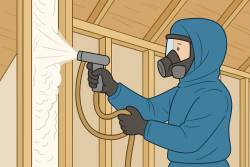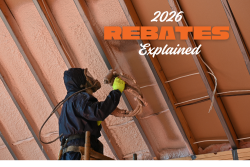The purpose of insulation is to make your home a comfortable place. But do you know certain risks and dangers are associated with the insulation material? Spray foam insulation is flammable and easily ignites when exposed to heat. Careful handling of such combustible material is crucial. The emphasis on fireproofing has increased because spray foam is a frequently used insulation material, and safety measures are a must. Any exposed polyurethane foam must be covered with a thermal barrier, such as drywall or fire retardant paint, as required by law.
Is Spray foam Fireproof?
No, spray foam is not fire-resistant. International Building Code states that spray foam, soundproofing foams, extruded polystyrene, foam boards, and other foam plastic components are all combustible. The material requires treatment with flame retardants to reduce the risk of igniting and burning. Adding fire retardant chemicals to spray foam insulation makes it more difficult to burn, giving inhabitants more time to evacuate and firefighters more time to arrive.
This shows that fireproofing the spray foam in insulation is vital. There are different methods of fireproofing the spray foam. You can consult a professional insulation contractor and get advice on which approach to adopt.
Add a Thermal Barrier
Spray foam insulation in a building requires a thermal barrier. It is what sets it apart from the public/residential areas. A thermal barrier separates the combustible spray foam from the flames in the event of a fire in the building, increasing fire resistance. It's resistant. It protects against heat and fire with a 10-minute delay. Furthermore, it complies with all construction codes and insurance company criteria. The ideal material for the thermal barrier is determined by testing it for fire integrity and temperature transmission.
Ignition Barrier Helps in Fireproofing
The thermal and ignition barriers are not the same thing. An ignition barrier is a layer of substance placed on the insulation to prevent it from igniting. A thermal barrier separates insulation from a living area to protect it from fire. An ignition barrier is a structure that keeps a potentially dangerous substance from burning. Ignition barrier provides fire protection in areas where spray foam insulation exists and is hard to access. If a property includes spraying foam insulation in the attic or crawl space, the building code requires the use of fire-resistant materials or components.
Fireproof Coating
Non-combustible chemicals called fire retardant coatings (or spray) are used in residential, industrial, and commercial buildings for the following reasons. It stops a fire from spreading. It slows the spread of fire. Reduce the intensity of a fire. Reduce the amount of smoke produced by a fire. Instead of using structural solutions like drywall, a fire-retardant spray coating might be used to coat bare insulation. This approach makes your insulation both fire-resistant and more appealing to the eye. The coating expands and bubbles when exposed to fire to protect the surface from heat. This product can only be utilized in crawl spaces, attics, and exposed open wall sections that aren't used for storage and aren't accessible.
Reitzel Insulation offers the best solutions for insulation-related problems and fireproofing services. We can guide you and help make your home a comfortable and safe place to live.

















